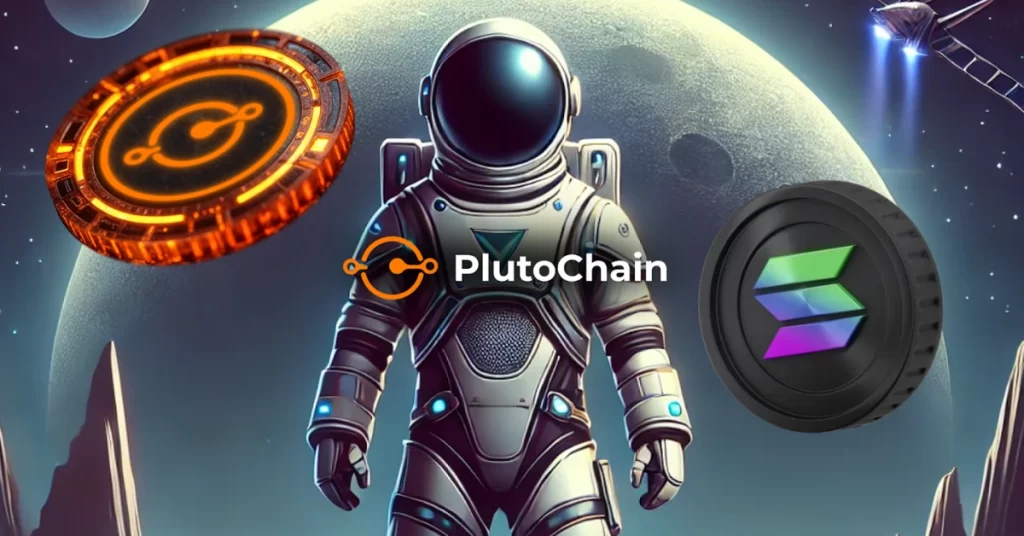
The post SOL to $1400? ETF Looks More Likely By the Day While PlutoChain Gains Whale Attention appeared first on Coinpedia Fintech News
Solana’s new ATH and consolidation above the $200 mark has analysts buzzing about its potential to break $1000 and maybe even reach $1,400. Will the potential acceptance of an ETF propel SOL to break records?
Meanwhile, PlutoChain ($PLUTO) could gain attention for its innovative approach to enhancing Bitcoin’s capabilities. With a new hybrid Layer-2 solution, this project offers a block time of just 2 seconds, enabling smart contracts and decentralized applications on the Bitcoin network.
This development could position PlutoChain as a key player in expanding Bitcoin’s ecosystem.
Let’s check out the details.
SOL ETF Rumors Heat Up – Is a $1,400 Price Target Realistic?
Solana ($SOL) is currently trading at $200, reflecting a decrease of 12% in the last 7 days. Despite this pullback, recent discussions have centered on the potential approval of a Solana ETF.
Analysts suggest that such an approval could propel SOL’s price to around $400 by 2025. However, reaching a $1,400 target would require unprecedented market momentum and significant investor confidence.
According to 7 reputable experts from InvestingHaven, medium-term Solana price predictions range from $220 to $750, averaging $450. Long-term, SOL predictions span $200 to $3,211, averaging $1,000. Their 2025 consensus indicates steady growth in the mid-hundreds.
The likelihood of a Solana ETF approval has increased, with prediction markets indicating a 75% chance of approval later this year.
In summary, while the approval of a Solana ETF could significantly boost SOL’s price, reaching a $1,400 valuation appears ambitious under current market conditions.
Ethereum-Like Functionality on Bitcoin? PlutoChain Could Make It Happen
Bitcoin’s biggest flaw might be its lack of smart contract functionality. It dominates the crypto market, yet its ecosystem remains limited. While Ethereum and Solana thrive with DeFi, NFTs, and AI-driven applications, Bitcoin struggles to compete.
PlutoChain ($PLUTO) might change it due to it being the first hybrid Layer-2 for Bitcoin that could enable smart contracts, dApps, and high-speed transactions without sacrificing security.
By offering an average block time of just 2 seconds (compared to Bitcoin’s 10-minute one) and potentially slashing transaction costs, PlutoChain could address Bitcoin’s scalability challenges while leveraging its robust security.
PlutoChain’s Ethereum Virtual Machine (EVM) compatibility could allow developers to migrate Ethereum-based applications effortlessly.
This means DeFi projects would no longer need Ethereum, Solana, or Cardano to function. Instead, they could potentially build directly on Bitcoin, utilizing its unmatched security.
With Bitcoin DeFi’s total value locked (TVL) at just 0.13% of its market cap, the opportunity is enormous. Additionally, PlutoChain’s testnet demonstrates its potential, processing 43,200 daily transactions.
Beyond speed and scalability, PlutoChain prioritizes decentralization. Governance is in the hands of platform users, who shape protocol upgrades and future developments through a unique governance system.
Security is rock-solid, with three independent audits from SolidProof, QuillAudits, and Assure DeFi ensuring trust. Bitcoin has always been a store of value. However, this project could help it become much more.
Final Words
Solana’s ETF rumors are heating up, fueling speculation that SOL could surge to $1,400. While we can see steady growth, such a target demands extreme market momentum. Approval optimism is rising, but delays could push a U.S. ETF launch to 2026.
Meanwhile, PlutoChain wants to tackle Bitcoin’s biggest limitation – its lack of smart contracts, scalability, and slow speed.
As the first hybrid Layer-2 for Bitcoin, it offers a 2-second average block time, low fees, and EVM compatibility. By potentially bridging Ethereum’s functionality with Bitcoin’s security, this project could redefine Bitcoin’s case uses and ecosystem reach.
———
Please remember that this article is purely informational and not financial advice. Any and all cryptocurrencies are volatile, with prices prone to rapid changes. Always do your own research and consult an expert before joining any crypto venture. We are not liable for any outcomes based on the information in this article. Statements about the future entail risks and may not reflect updates.
















